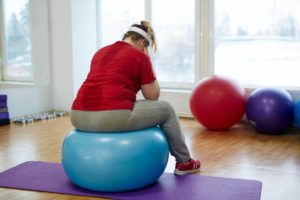Behavior Change: What the Research Tells Us
Behavior change psychology has immense value to personal trainers and other fitness pros looking to motivate their clients.
Bone Loss: A Primer
Bone loss is a normal part of aging, and understanding it can help fitness professionals to develop preventive strategies for their clients.
A New Way to Combat High Blood Pressure During Menopause
Researchers have linked menopause with arterial stiffness and high blood pressure. A recent study of Korean women, led by The North American Menopause Society, suggests that taking the stairs is a good way to manage those conditions.
There Is Arsenic in Your Rice
For generations, pediatricians have recommended rice cereal as a first food for babies in the transition to eating solids. Rice cereal is easy for babies to eat and is high in iron, an important nutrient for growing brains. However, recent research cited in Consumer Reports found persistently high levels of arsenic in rice and rice products, including infant rice cereal.
Rice tends to absorb more arsenic than other grains mostly because it is grown in water-flooded soil.
Sugary Drinks in Pregnancy Linked to Increased Asthma Risk in Babies
The thirst for sugary drinks remains strong in all U.S. populations despite multiple health risks. However, moms-to-be have a new reason to decrease (or better, eliminate) sugary drinks during their pregnancies. A new study in Annals of the American Thoracic Society suggests that limiting intake of sweetened beverages may lower babies’ asthma risk in childhood (in addition to reducing the risk of obesity).
Female Athletes May Need to Pump Up the Protein
Female team athletes may need more protein for optimal recovery than previous research has suggested, according to a new study published in Medicine & Science in Sports & Exercise, the American College of Sports Medicine’s flagship journal. This study looked at six women engaging in variable-intensity intermittent exercise, the activity style common to most team sports.
Exercise Responses Vary Among Women
A new study from Bangor University in Wales affirms that body type influences a woman’s response to exercise, potentially affecting weight management success.
Female participants were assigned to either a 4-week or 8-week circuit training intervention. The women met three times per week and exercised at 50%–90% VO2 peak for 45–90 minutes per session. They were instructed not to diverge from their usual diets.
Body Image and the Fitness Industry
A look at why the fitness industry does indeed have a body image problem—and what we can do about it, starting now.
Mindfulness, Stress and Blood-Sugar Regulation
A Penn State University study found that women with overweight or obesity had significantly lower levels of stress and fasting glucose after participating in a mindfulness-based stress reduction [MBSR] program. Researchers evaluated the effects of MBSR on cardiometabolic outcomes in 86 women with overweight or obesity. The 8-week MBSR program—which consists of group training in mindfulness, stress reduction, mindful movement and meditation—includes weekly 2.5-hour sessions, one 6-hour retreat and a recommendation of daily home practice.
Exercise Gives Women Instant Memory Boost
Do you have something important to remember? Study it first, and then take a short, light jog around the block. New science suggests that a memory will stick more easily if it’s followed up by a quick workout—if you’re a woman.
Abdominal Separation and the Female Core
Imagine a balloon—a standard latex party balloon. You put a tiny seed in it. A watermelon starts to grow. You pick up the balloon with the watermelon growing inside. You carry it with you all day. You sit with it, stand up with it, run with it, take it wherever you go. What happens? How long will that balloon hold up?
Now imagine the same scenario with a stronger balloon, a Mylar balloon, with reinforced seams.
Women, Men and Mindfulness
Educating men in mindfulness skills via mind-body movement like yoga and tai chi may be more successful than encouraging introspective activities.
In a paper presented in Frontiers in Psychology (2017), Brown University researchers in Providence, Rhode Island, discovered that men and women respond differently to training in meditation and mindfulness skills. Women significantly improved a negative mood by participating in the training, while men felt slightly worse.
How to Motivate Inactive Women to Exercise
Michelle Segar, PhD, author of No Sweat: How the Simple Science of Motivation Can Bring You a Lifetime of Fitness (AMACOM 2015), believes that when it comes to motivating women to exercise, we’ve been doing it all wrong. Recently, she and a team of researchers asked women about their daily goals and considered whether shifting the messaging surrounding exercise to align with those goals might get more women to move more.
Mind-Body Exercise and Menopause
Are you in menopause? Chances are that you sometimes feel that you are not in control of your body! If you are seeking ways to cope with unpleasant menopausal symptoms, you may want to try yoga and other mind-body practices.
Shirley Archer, JD, MA, 2008 IDEA Fitness Instructor of the Year, an award-winning author and IDEA’s mind-body spokesperson, explains the research and application of mind-body exercise on menopause.
Irritability and Mood Swings
Women Who Run Marathons Have Lower Coronary Plaque Buildup
Ladies: Lace up those tennies. According to new research, women who regularly complete marathons have less coronary-plaque buildup—and therefore a lower risk of stroke or heart attack—than sedentary women.
Water-Based Weight Loss Programs Help Older Women Manage Knee Problems
Ratcheting up the intensity of water workouts may help women lose weight without exacerbating knee pain, suggests a new study. Knee osteoarthritis (OA) affects around 13% of women aged 60 and older, and the condition can make it painful for them to exercise and lose weight. It can also become a Catch-22, because carrying excess weight can worsen the problem.
Exercise Lowers Breast Cancer Return Risk
Thirty percent of women who overcome breast cancer experience a recurrence (www.breastcancer.org). Recently, scientists reviewed 67 studies to determine whether lifestyle choices—like physical activity, alcohol intake, diet and smoking—had links to recurrence. The goal was to help women make changes in lifestyle that might prevent the disease from returning.
Optimism and Women’s Health
Are you an optimist, and do you encourage others to look on the bright side? If yes, then you may be supporting your own and other people's health in a powerful way.
A recent study found that optimistic women are more likely to live longer than their pessimistic peers. Optimism, defined as a generalized expectation that good things will happen, was associated with lower risk of premature death from stroke, heart disease, respiratory disease, infection and cancer.
Weak Thighs May Lead to Knee Problems in Women
Research suggests that women are more likely than men to develop knee osteoarthritis (KOA). Improving thigh muscle strength may be one way to get a leg up on reducing or preventing the condition, according to a new study.
This study compared muscle anatomical cross–sectional areas &lpar:ACSAs) and isometric extensor and flexor muscle strength in 161 KOA patients against the same factors in 186 individuals without the condition. The researchers also looked at BMI as a possible contributor to knee osteoarthritis.
Tai Chi and Women’s Heart Health
Tai chi may also be helpful for women with higher-than-average risk of developing heart disease. A study from Virginia Commonwealth University suggests the
practice may reduce fatigue and inflammation, while increasing mindfulness, self–compassion and spirituality, in this population.


















